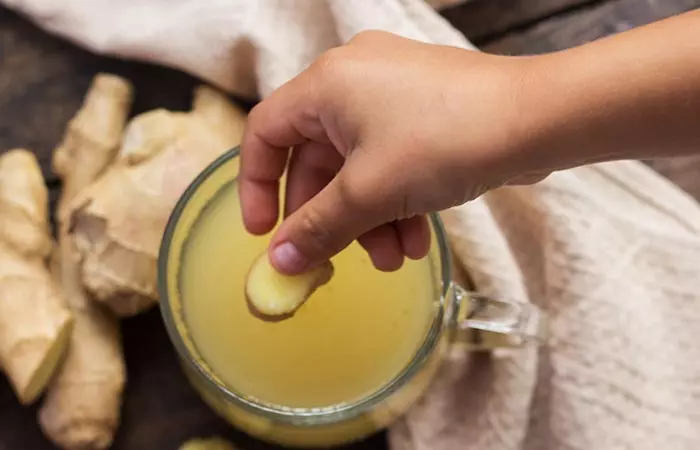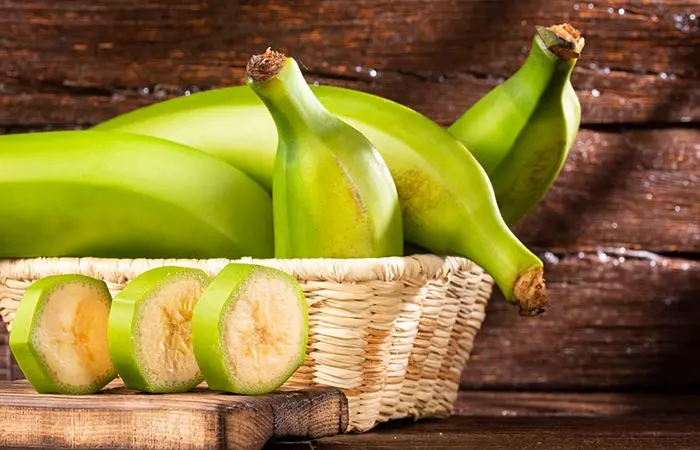Home Remedies For Gastroenteritis: 10 Science-Backed Treatments
Soothe your sick stomach with a combination of ingredients available in your kitchen.

Image: Shutterstock
If you are experiencing stomach cramps, vomiting, and watery stools, you need to start following some home remedies for gastroenteritis immediately. Gastroenteritis, commonly known as the stomach flu, is a highly contagious stomach and intestinal infection. Gastroenteritis can be triggered by viruses, bacteria, or parasites.
Research indicates that 685 million people globally suffer from acute gastroenteritis caused by the Norovirus (1). Out of these cases, 200 million children under 5 years of age suffer from this condition, and approximately 50,000 children die annually. While most cases of the stomach flu go away on their own, it is a good idea to follow some home remedies to treat it effectively. Scroll down to know more!
Note: If the symptoms of gastroenteritis persist beyond a week, consult a healthcare provider immediately.
 Fun Fact
Fun FactIn This Article
What Is Gastroenteritis (Stomach Flu)?
Gastroenteritis is a viral or bacterial infection that is characterized by symptoms like diarrhea and vomiting.
It causes inflammation of the stomach lining and intestines and is commonly referred to as stomach flu.
A study conducted on 3,894 members found the prevalence of acute gastroenteritis was at 10.4% in the 30-day period, while diarrhea alone affected 7.6%. Acute gastroenteritis and diarrhea had an annual rate of 1.27 cases per person per year and 0.92 per person per year respectively.
One of the most common ways in which you can contract gastroenteritis is through direct contact with an infected person or ingesting contaminated food/water.
Healthy individuals often recover from this condition without any complications. However, for those with a weak immune system, like infants and older adults, gastroenteritis can prove to be life-threatening.
Let us now look at the common causes of gastroenteritis.
Key Takeaways
- Hydration is often the main cause of Gastroenteritis; thus, drinking fluids like water, ice pop, broth, and clear soda is mandatory to avert this condition.
- The BRAT diet, ginger, mint, lemon, and probiotics also soothe an upset stomach, relieve nausea, and improve the digestive system.
- If you are having gastronomical problems, avoid spicy food, alcohol, caffeine, and raw vegetables.
- Consult a doctor if you are still experiencing problems even after following these remedies.
What Causes Gastroenteritis?
The most common cause of gastroenteritis is a virus. It can be triggered by various kinds of viruses like rotavirus and norovirus.
Although not as common, gastroenteritis may also be triggered by bacteria like E. coli, shigella, and salmonella.
Gastroenteritis can also be caused by certain parasites like giardia and cryptosporidium, which are commonly found in contaminated swimming pools.
Some factors that can further increase your risk of developing gastroenteritis are discussed below.
- Age – Infants and older adults are at a higher risk of contracting gastroenteritis.
- Weakened immunity due to an ongoing medical condition.
- Drinking water that is contaminated with heavy metals like arsenic, lead, or mercury.
- Increased consumption of acidic foods.
- Eating seafood contaminated with toxins.
- Certain medications like antibiotics, antacids, chemotherapy drugs, and laxatives.
If you have gastroenteritis, you are quite likely to exhibit the following signs and symptoms.
Signs And Symptoms Of Gastroenteritis

The most common symptoms are nausea, vomiting, and diarrhea. Dr. Jesse P. Houghton, MD, FACG, and Medical Director of Gastroenterology at the Southern Ohio Medical Center, adds, “However, abdominal cramping is often associated with these symptoms, especially during periods of vomiting. Rarely, the pain can be significant.”
The signs and symptoms of gastroenteritis may include:
- Watery diarrhea
- Vomiting
- Stomach pain
- Fever
- Nausea
- Cramping
- Headache
- Dehydration
- Dry skin and mouth
- Lightheadedness
- Increased thirst
Jeremy Puma, a blogger, had an unfortunate and painful ordeal with gastroenteritis. He had initially mistaken his symptoms for a hangover after a night of drinking but soon realized it was something far worse. He said, “This time, it was the whole nine yards (or however many yards long your digestive tract is), and multiple trips up and down the stairs to the basement bathroom so as not to inconvenience the other guests. Once the chills and aches started kicking in, I knew what was really going on (i).”
In infants, you may look for signs of fewer and drier diapers. Thirst and a dry mouth and skin can also be common indications of stomach flu in infants. Should you or your little one show any signs of gastroenteritis, visit a doctor immediately. Any delay may cause further complications. Learn more in the next section.
Complications Of Gastroenteritis
If left untreated, gastroenteritis can lead to further complications in the body. The most common complications are (2):
- This is the most frequent, underestimated, and dangerous complication.
- Metabolic acidosis. This is the buildup of acid in the body due to kidney damage or failure.
- Electrolyte imbalances (hypernatraemia, hyponatremia, hypokalaemia).
- Lactose or glucose intolerance.
- Food sensitivities or intolerance.
- Hemolytic uraemic syndrome.
- Iatrogenic (caused by medical treatment) complications due to disproportionate intravenous fluids.
- Death, in severe cases.
Gastroenteritis is not to be taken lightly. You should consult a medical professional for the right treatment. But when? Keep reading to learn about it.
When To Seek Medical Attention
You should seek medical attention for gastroenteritis if symptoms like severe dehydration, persistent vomiting, or high fever occur. Also, if diarrhea lasts for more than a few days, or you notice blood in your stool, it is important to see a doctor. Young children, the elderly, and people with weakened immune systems are at higher risk and should consult a healthcare provider sooner if symptoms are severe or prolonged.
The doctor will conduct some tests to understand the exact cause and severity of the condition. Read on to know about it.
How To Test For Gastroenteritis
The doctor is quite likely to diagnose gastroenteritis based on the symptoms exhibited by the patient on physical examination.
If a viral cause is suspected, the doctor may suggest a stool test to detect rotavirus or norovirus. A stool test can also help rule out a possible parasitic or bacterial infection.
Once the cause of gastroenteritis is determined, the doctor may prescribe treatment accordingly.
Medical Treatments
The doctor may prescribe antibiotics if the person has contracted bacterial gastroenteritis. Some over-the-counter medications can be taken to manage the symptoms. However, if the cause is viral, there is no specific medical treatment to help with the condition. The doctor may suggest some self-care measures to overcome stomach flu faster in such cases.
The following are some home remedies that can speed up your recovery from gastroenteritis naturally.
Home Remedies For Gastroenteritis
- Apple Cider Vinegar
- Probiotic Yogurt
- Honey
- Ginger
- Turmeric
- Cinnamon
- Rice Water
- Chamomile Tea
- Lemon
- Green Banana
1. Apple Cider Vinegar

Apple cider vinegar possesses powerful antimicrobial properties against microbes like E. coli and may be able to help with bacterial gastroenteritis. A 2018 study published in Scientific Reports investigated the antimicrobial effects of apple cider vinegar (ACV) against Escherichia coli, Staphylococcus aureus, and Candida albicans. The minimum inhibitory concentration varied among species, with a 1/2 dilution being most effective against C. albicans, 1/25 dilution for S. aureus, and 1/50 dilution for E. coli. ACV also exhibited anti-inflammatory effects. These findings suggest that ACV possesses broad-spectrum antimicrobial properties with potential clinical applications in treating infections and modulating inflammation (3).
You Will Need
- 1 tablespoon of raw apple cider vinegar
- 1 cup of warm water
What You Have To Do
- Add a tablespoon of raw apple cider vinegar to a cup of water.
- Mix well and drink the solution.
How Often You Should Do This
You may drink this once daily until you notice an improvement in your symptoms.
2. Probiotic Yogurt
Probiotic yogurt can help restore the gut flora. This can help reduce the inflammation in the lining of the intestine. It can also help improve non-inflammatory gastroenteritis. A 2010 clinical trial published in Saudi Medical Journal compared the effects of traditional yogurt and probiotic yogurt on acute non-inflammatory gastroenteritis in children aged 6 months to 12 years. Conducted as a double-blind, case-control study in Iran, the trial involved 100 patients divided into two groups: one receiving probiotic yogurt and the other ordinary yogurt. Results showed that probiotic yogurt significantly reduced diarrhea frequency within the initial days of treatment. These findings suggest that probiotic yogurt accelerates recovery in children with acute non-inflammatory gastroenteritis (4).
You Will Need
A bowl of probiotic yogurt
What You Have To Do
Consume a bowl of probiotic yogurt. You can also consume buttermilk with cumin and coriander.
How Often You Should Do This
You can consume this once daily.
Caution: Do not proceed with this remedy if you are allergic to lactic acid.
 Did You Know?
Did You Know?3. Honey
The antibacterial and anti-inflammatory properties of honey can speed up your recovery from gastroenteritis while reducing the duration of its symptoms (5).
You Will Need
- 1-2 teaspoons of raw honey
- 1 cup of water
What You Have To Do
- Add one to two teaspoons of raw honey to a cup of water.
- Mix well and drink the solution.
- You can also add honey to the oral rehydration solution (ORS) being given to your child.
How Often You Should Do This
You may do this 2-3 times daily.
Caution: Honey should not be given to children below 1 year due to the risk of developing botulismi A rare but fatal poisoning caused by infection or consuming food contaminated with toxin producing bacteria. .
4. Ginger

Ginger has anti-inflammatory and antioxidant properties. This can help reduce the inflammatory symptoms associated with gastrointestinal disorders like gastroenteritis. A 2018 systematic review published in Food Science & Nutrition examined the effects of ginger (Zingiber officinale) on gastrointestinal disorders based on clinical trials. Ginger has long been used as a medicinal spice and is known for its anti-inflammatory, antioxidant, antitumor, and antiulcer properties. This review found that a divided daily dose of 1500 mg of ginger is effective in relieving nausea. However, due to the limited number of studies on other gastrointestinal conditions, the evidence is not strong enough to draw definitive conclusions (6).
You Will Need
- 1 inch of sliced ginger
- 1 cup of water
What You Have To Do
- Add an inch of sliced ginger to a cup of water.
- Bring it to a boil in a saucepan.
- Simmer for a few minutes and strain.
How Often You Should Do This
You may drink ginger tea twice daily.
5. Turmeric
Curcumin, the major component of turmeric, exhibits anti-inflammatory and antioxidant properties. These activities of curcumin impart gastroprotective effects to turmeric that can help in the treatment of gastroenteritis and its inflammatory symptoms (7).
You Will Need
- 1 teaspoon of turmeric powder
- 1 glass of hot milk
What You Have To Do
- Add a teaspoon of turmeric powder to a glass of hot milk.
- Mix well and drink the mixture.
How Often You Should Do This
You may do this once daily.
6. Cinnamon

Cinnamon is a multifaceted herb with anti-inflammatory, antioxidant, and antimicrobial properties (8). Along with cinnamon, food enriched with spices, such as fennel, carom seeds, cloves, licorice root, and herbs, such as holy basil, or fenugreek, slippery elm powder, marshmallow root can also help with gastroenteritis as well as help manage an upset stomach.
You Will Need
- An inch of cinnamon stick
- 1 cup of water
- Honey (as required)
What You Have To Do
- Add a cinnamon stick to a cup of water.
- Bring it to a boil in a saucepan.
- Simmer for 5 minutes and strain.
- Allow the tea to warm a bit before drinking it.
How Often You Should Do This
You may drink this 1-2 times daily.
7. Rice Water
Rice water can be used as an alternative to ORS in infants with gastroenteritis as it can cut down the number of stools (diarrhea) (9).
You Will Need
A cup of rice water
What You Have To Do
- Strain the remaining water after your rice has cooled completely.
- Feed small amounts of rice water to your infant after every watery bowel movement they have had.
- You can also drink rice water to deal with gastroenteritis.
How Often You Should Do This
You may do this multiple times daily until the symptoms begin improving.
8. Chamomile Tea
Chamomile, a widely popular digestive relaxant, is known for its effectiveness in treating many gastrointestinal disturbances, such as loose motion and vomiting, which often accompany gastroenteritis (10).
You Will Need
- 1 teaspoon of chamomile tea
- 1 cup of hot water
What You Have To Do
- Add a teaspoon of chamomile tea to a cup of hot water.
- Steep for a few minutes and strain.
- Drink the warm concoction.
How Often You Should Do This
You may drink this 1-2 times daily.
9. Lemon
Lemons are rich sources of citrate, which can be used in the treatment of viral gastroenteritis caused by norovirus (11).
You Will Need
- ½ lemon
- 1 glass of water
What You Have To Do
- Squeeze out the juice from a lemon into a glass of water.
- Mix well and drink the juice.
How Often You Should Do This
You may do this once daily.
10. Green Banana

Green banana is a rich source of pectin and is one of the most sought-after home remedies to get rid of diarrhea. So, it can help reduce symptoms of gastroenteritis, like diarrhea, in children. It can also help in speeding up recovery from the condition (12).
You Will Need
- 1 green or unripe banana
- Water (as required)
What You Have To Do
- Boil a green banana with its skin in water.
- Simmer for 7-10 minutes and switch off the stove.
- Allow the banana to cool down a bit and remove its skin.
- Mash the fruit and add salt to taste.
- Consume alone or with rice.
How Often You Should Do This
You may have to do this 1-2 times daily until your symptoms show an improvement.
Try the remedies listed above to manage the symptoms of gastroenteritis and accelerate your recovery from the infection. Given below are a few tips to avoid contracting stomach flu.
How To Prevent Stomach Flu
- Drink plenty of fluids in the form of juices or coconut water to prevent dehydration.
- Get your child vaccinated against rotavirus.
- Wash your hands thoroughly before eating and after using the loo.
- Do not share personal utensils with an infected person until he/she recovers.
- Avoid drinking chilled water.
- Do not consume raw meat or raw foods like sushi.
- Disinfect all the hard surfaces at your home if any of your family members have gastroenteritis.
- Avoid sending your child to the daycare centre until they recover completely to prevent the infection from spreading.
- Get ample rest and sleep well.
As already discussed, there is no specific medical treatment for gastroenteritis. Rest and hydration, coupled with the remedies mentioned above, can help in speeding up your recovery from gastroenteritis without any further complications.
Infants and older adults who have stomach flu should be given extra care as this infection can prove to be life-threatening, given their compromised immunity.
Contact a doctor immediately if your symptoms worsen, or you develop a high fever (>102o F), are unable to keep liquids down for more than 24 hours or exhibit signs of dehydration, vomit blood, or have bloody diarrhea.
Infographic: Best Natural Remedies For Gastroenteritis
You’re throwing up. You’re unable to stop using the restroom. You’re worn out, and everything that happened to you seems to have occurred out of the blue. Could it be gastroenteritis? If so, you undoubtedly want to learn how to treat it quickly. But how? Thankfully, many people with the stomach flu recover within a day. And fortunately, there are many excellent natural remedies to speed up your recovery from a severe stomach illness. Check out the infographic below!
Some thing wrong with infographic shortcode. please verify shortcode syntax
Gastroenteritis, or stomach flu, is a contagious infection of the stomach and the intestines characterized by inflammation of the linings. Vomiting, watery stools, nausea, stomach cramps, lightheadedness, dehydration, and fever are common signs of gastroenteritis. For bacterial gastroenteritis, you may take prescription antibiotics, but if it is viral, then self-care and home remedies can help you recover quickly from the stomach infection. Apple cider vinegar, probiotics, honey, ginger, garlic, rice water, lemon, and unripe bananas are easily available ingredients you can use as home remedies for stomach viruses and to cure gastroenteritis. Infants are very susceptible to stomach flu, and it can be very dangerous in their cases, so consult a pediatrician if you see signs such as loose stools, dry diapers, and dry mouth. If the symptoms persist over a week, it is imperative to seek medical attention for children and adults.
Frequently Asked Questions
Can you have gastroenteritis without vomiting?
Yes. Dr. Houghton says, “Gastroenteritis can occur as abdominal cramping with diarrhea only.”
Is stomach flu going around?
Stomach flu can infect any healthy individual. Its symptoms usually develop 12-48 hours after exposure to the microbes. Viral gastroenteritis is very common during winters.
Is gastroenteritis contagious?
Yes, gastroenteritis is highly contagious and can spread through direct contact with an infected person or surface. It can also spread through contaminated food and water.
How long does gastroenteritis last?
The symptoms of gastroenteritis usually appear 1-3 days post-exposure to the infection. Its symptoms usually last for 1-2 days but may go on to last for even 10 days in some individuals.
Are the stomach flu and food poisoning the same thing?
Stomach flu is commonly caused by a viral infection, while food poisoning may be caused by a range of bacteria, viruses, and parasites. While stomach flu can be transmitted via contaminated food/water or by direct contact with an infected person, food poisoning usually occurs due to the cross-contamination of food items with troublesome microbes.
Will the above remedies help in the treatment of stomach flu in kids?
Check with your doctor to find out which of the above remedies is safe for your infant. Most of the remedies are relatively safe for kids above 1 year.
What is the difference between gastritis and gastroenteritis?
Gastritis is a condition that causes inflammation of the stomach lining. Underlying medical conditions like Crohn’s diseasei A bowel disease caused by probable autoimmune reactions that leads to swelling and inflammation in the digestive tract. and sarcoidosisi A disease where tiny collections of inflammatory cells grow in different parts of the body, commonly in the lymph nodes and lungs. can trigger this condition. Gastritis can also be a result of a bacterial infection or an injury to your stomach lining due to your dietary choices. Having a gastritis diet rich in fiber, healthy fats, probiotics, and lean proteins may control this infection and alleviate its symptoms.
On the other hand, gastroenteritis is a stomach infection that is commonly caused by viruses. However, in some cases, gastroenteritis may also be caused by a bacterial or parasitic infection.
Both these conditions lead to the inflammation of the stomach lining and cause symptoms like nausea and vomiting. However, gastroenteritis is more severe and can prove to be life-threatening to people with a weak immune system.
What to eat when you have the stomach flu?
If you have the stomach flu, it is very important to keep yourself well-hydrated by drinking plenty of fluids, such as soups, rice water, chicken broth, and ORS. You may suck on some ice chips if you have trouble keeping the fluids down.
You can also give the BRAT diet a try, which stands for Bananas, Rice, Applesauce, and Toast or crackers. This diet can help in firming your stool and treating diarrhea (13).
Is milk good for gastroenteritis?
It is best to avoid milk during gastroenteritis as digesting the lactose in milk may be a challenge.
Is egg good for gastroenteritis?
Eggs may not help treat the condition. However, since eggs are a good protein source, they may help you recover from gastroenteritis.
Is hot water good for gastroenteritis?
There are not enough studies to suggest if drinking hot water helps with gastroenteritis. Some believe ingesting hot water may aggravate the condition. Consult your doctor for details in this regard. However, you can apply hot water bags to your abdomen after massaging it with peppermint oil, eucalyptus oil, lavender oil, chamomile oil, or tea tree oil to help with bloating, flatulence and to soothe the pain and cramps.
What are the risks of gastroenteritis for young children and the elderly?
Young children and the elderly are at higher risk of dehydration from gastroenteritis due to fluid loss from vomiting and diarrhea. They may also experience more severe forms of the same symptoms and complications mentioned in the article. It is important to monitor them closely and seek medical care if needed.
Illustration: Home Remedies For Gastroenteritis (Stomach Flu) + Prevention Tips
_+_prevention_tips_illustration.jpg.webp)
Image: Stable Diffusion/StyleCraze Design Team
References
Articles on StyleCraze are backed by verified information from peer-reviewed and academic research papers, reputed organizations, research institutions, and medical associations to ensure accuracy and relevance. Read our editorial policy to learn more.
- Norovirus Burden and Trends
https://www.cdc.gov/norovirus/data-research/?CDC_AAref_Val=https://www.cdc.gov/norovirus/burden.html - Elliott, Elizabeth Jane. “Acute gastroenteritis in children.” BMJ (Clinical research ed.) vol. 334,7583 (2007): 35-40.
https://www.ncbi.nlm.nih.gov/pmc/articles/PMC1764079/ - Yagnik, Darshna et al. “Antimicrobial activity of apple cider vinegar against Escherichia coli, Staphylococcus aureus and Candida albicans; downregulating cytokine and microbial protein expression.” Scientific reports vol. 8,1 1732. 29 Jan. 2018.
https://www.ncbi.nlm.nih.gov/pmc/articles/PMC5788933/ - Heydarian, Farhad et al. “A comparison between traditional yogurt and probiotic yogurt in non-inflammatory acute gastroenteritis.” Saudi medical journal vol. 31,3 (2010): 280-3.
https://pubmed.ncbi.nlm.nih.gov/20231933/ - Abdulrhman, Mamdouh Abdulmaksoud et al. “Bee honey added to the oral rehydration solution in treatment of gastroenteritis in infants and children.” Journal of medicinal food vol. 13,3 (2010): 605-9.
https://pubmed.ncbi.nlm.nih.gov/20438327/ - Nikkhah Bodagh, Mehrnaz et al. “Ginger in gastrointestinal disorders: A systematic review of clinical trials.” Food science & nutrition vol. 7,1 96-108. 5 Nov. 2018.
https://www.ncbi.nlm.nih.gov/pmc/articles/PMC6341159/ - Yadav, Santosh Kumar et al. “Turmeric (curcumin) remedies gastroprotective action.” Pharmacognosy reviews vol. 7,13 (2013): 42-6.
https://www.ncbi.nlm.nih.gov/pmc/articles/PMC3731878/ - Shen, Yan et al. “Beneficial effects of cinnamon on the metabolic syndrome, inflammation, and pain, and mechanisms underlying these effects – a review.” Journal of traditional and complementary medicine vol. 2,1 (2012): 27-32.
https://www.ncbi.nlm.nih.gov/pmc/articles/PMC3943007/ - Wong, H B. “Rice water in treatment of infantile gastroenteritis.” Lancet (London, England) vol. 2,8237 (1981): 102-3.
https://pubmed.ncbi.nlm.nih.gov/6113434// - Srivastava, Janmejai K et al. “Chamomile: A herbal medicine of the past with bright future.” Molecular medicine reports vol. 3,6 (2010): 895-901.
https://www.ncbi.nlm.nih.gov/pmc/articles/PMC2995283/ - Koromyslova, Anna D et al. “Treatment of norovirus particles with citrate.” Virology vol. 485 (2015): 199-204.
https://pubmed.ncbi.nlm.nih.gov/26295280// - Rabbani, G H et al. “Clinical studies in persistent diarrhea: dietary management with green banana or pectin in Bangladeshi children.” Gastroenterology vol. 121,3 (2001): 554-60.
https://pubmed.ncbi.nlm.nih.gov/11522739// - Nemeth, Valerie, Hassam Zulfiqar, and Nicholas Pfleghaar. “Diarrhea.” StatPearls [Internet]. StatPearls Publishing, 2019.
https://www.ncbi.nlm.nih.gov/books/NBK448082/
Read full bio of Dr. Jennifer Mercier
- Dr. Jesse P. Houghton, MD, FACG, is a gastroenterologist with over two decades of experience in internal medicine and gastroenterology. He has been practicing at Southern Ohio Medical Center as the Senior Medical Director of Gastroenterology since 2012. He is also an Adjunct Clinical Associate Professor of Medicine at the Ohio University School of Osteopathic Medicine.
 Dr. Jesse P. Houghton, MD, FACG, is a gastroenterologist with over two decades of experience in internal medicine and gastroenterology. He has been practicing at Southern Ohio Medical Center as the Senior Medical Director of Gastroenterology since 2012. He is also an Adjunct Clinical Associate Professor of Medicine at the Ohio University School of Osteopathic Medicine.
Dr. Jesse P. Houghton, MD, FACG, is a gastroenterologist with over two decades of experience in internal medicine and gastroenterology. He has been practicing at Southern Ohio Medical Center as the Senior Medical Director of Gastroenterology since 2012. He is also an Adjunct Clinical Associate Professor of Medicine at the Ohio University School of Osteopathic Medicine.
Read full bio of Shaheen Naser
Read full bio of Arshiya Syeda
Read full bio of Dipti Sharma



























Community Experiences
Join the conversation and become a part of our empowering community! Share your stories, experiences, and insights to connect with other beauty, lifestyle, and health enthusiasts.